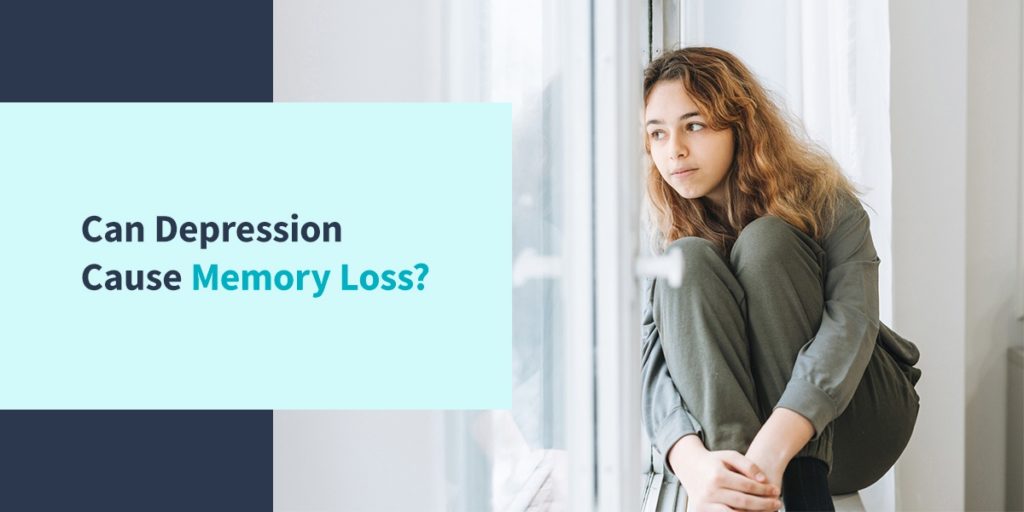
Depression can cause memory loss due to cognitive side effects — individuals with depression can experience short-term or long-term memory loss over time. Mild, occasional forgetfulness is a normal occurrence, but frequent forgetfulness or trouble remembering important names, skills, rules or people can indicate more serious memory loss.
While memory loss can interfere with daily life and impact functioning, people can manage their memory loss with helpful techniques. Individuals can also improve their memory functioning with a non-invasive medical treatment known as transcranial magnetic stimulation (TMS). TMS therapy stimulates sections of the brain to improve symptoms of depression and memory loss.
What Is Memory Loss?
Short-term memory loss causes people to forget recent information. Someone with short-term memory loss will often forget information that the brain retained over a short period, usually up to 30 seconds.
It’s normal for people to occasionally forget information if they are distracted or not working to remember certain information. However, frequent forgetfulness that interferes with daily life and functioning can signify short-term memory loss.
Long-term memory includes information our brains collect over a long period. Our long-term memory can include information such as skills, words, rules, people, facts or events. Long-term memory loss can cause people to forget this information. A person with long-term memory loss may get lost easily or replace memory gaps with false information.
What Causes Memory Loss?
Various conditions, substances and injuries can lead to short-term or long-term memory loss. Memory impairment causes and symptoms are slightly different for short-term and long-term memory. Short-term memory loss can be caused by the following conditions and events:
- Substance misuse: Substance misuse, especially alcohol misuse, can cause short-term memory loss.
- Hypothyroidism: Hypothyroidism can impact memory.
- Head injuries: Head injuries such as concussions can cause impairment and memory loss.
- Diseases that affect the brain: Diseases and conditions that affect the brain such as brain tumors, infections and blood clots can cause memory loss.
- Medication side-effects: Medications such as narcotics, benzodiazepines and seizure medications can impact memory.
- B-12 deficiency: Memory loss can occur when vitamin B-12 levels drop, especially in older individuals.
- Mental health conditions: Conditions such as depression, stress and anxiety can impact memory.
Most people commonly associate long-term memory loss with aging. The following conditions can also cause long-term memory loss:
- Alzheimer’s disease
- Dementia
- Oxygen loss
- Excess fluid around the brain, known as hydrocephalus
- Significant substance misuse
- Strokes
- Epilepsy
- Serious brain injuries and infections
- Brain tumors
Can Depression Cause Memory Loss?

Can depression affect memory loss? Depression and memory loss are closely connected, which means depression can affect memory functioning and potentially cause memory loss. It can cause short-term memory loss and increase the risk of long-term memory loss.
Depression is a common condition that affects approximately 5% of the world’s population, and it can impair cognition, decrease concentration and slow down thought processes. A person with depression may experience some or all of the following symptoms:
- Feelings of sadness, worthlessness or hopelessness
- Anxiety
- Loss of pleasure or interest
- Irritability
- Low energy
- Fatigue
- Restlessness
- Weight or appetite changes
- Difficulty sleeping
- Oversleeping
- Suicidal thoughts
- Aches and pains without a physical cause
Studies indicate some individuals who experience depression gradually struggle to recall relevant information. They may also experience the following symptoms related to cognitive functioning:
- Slower response time
- Difficulty reasoning and making decisions
- Trouble concentrating and making plans
- Difficulty paying attention
- Frequent forgetfulness
Depression causes cognitive distortions in some cases, which occur when the brain views life on a negative slant that feels real even when it isn’t. Studies have found that cognitive distortions can indicate the beginning phases of neurodegenerative dementia, which is a gradual loss of memory over time. Depression’s cognitive symptoms can persist and eventually develop into dementia even after depression wanes. Late-life depression can increase an older individual’s chances of developing dementia.
How to Manage Memory Loss
Managing memory loss can help people with depression better function in their daily tasks and responsibilities. A person experiencing memory loss can manage symptoms with the following methods:
- Limiting distractions
- Slowing down to concentrate on information
- Writing reminders down
- Creating digital reminders with notifications
- Focusing on one task at a time
If you are experiencing memory loss, try to dedicate extra attention to the information you receive and make additional efforts to commit that information to your memory. Focus on one small task at a time and slow down to truly concentrate on facts, dates, names and instructions when you receive them.
Write important information down in a notepad, a journal, or a planner. You could even use your phone to set digital notifications to remind you of important dates, appointments and schedules.
Treating depression and caring for mental health with methods such as therapy, meditation, exercise, adequate sleep and anti-depressant medications can help improve the condition causing memory loss. Chronic depression treatment options such as cognitive behavioral therapy (CBT) can significantly improve depression symptoms, and memory training can help manage memory functioning. Memory training can include any of the following methods:
- Memory specificity training: Memory specificity training can help people with depression generate more specific memories.
- Real-time fMRI neurofeedback training: Real-time fMRI neurofeedback training uses functional magnetic resonance imaging to view brain activity in real-time and helps people learn how to work with certain brain areas and functions.
- Memory rescripting: Rescripting memories helps people reduce distressing feelings associated with negative memories.
- Method of Loci (MoL): The Method of Loci helps individuals mentally visualize items they wish to remember in familiar locations such as their neighborhood or home. This mental manipulation strategy helps people recall information by mentally associating it with physical places they are familiar with.
Treatment Options for Memory Loss
Memory loss can inhibit a person’s ability to perform daily tasks and responsibilities, but transcranial magnetic stimulation can improve memory functioning. TMS is a non-invasive, FDA-approved medical treatment that stimulates the brain to improve mental conditions such as depression and memory loss.
TMS involves attaching a coil to a person’s head along with a cap to secure it in place. The coil then delivers stimulating waves to certain areas of the brain. The stimulating waves help the targeted areas of the brain function more effectively.
Contact My TMS Therapy
Depression and memory loss can be confusing and frustrating, but treatment can help improve brain functioning. The My TMS Therapy team is here to help you improve symptoms so you can get back to enjoying your everyday life. Our board-certified psychiatrists and nurse practitioners are trained and qualified to discuss your condition with you and implement a plan to help improve your symptoms.
TMS therapy can significantly improve mental functioning to treat depression and memory loss. Contact us to learn more about TMS therapy and schedule an appointment.


